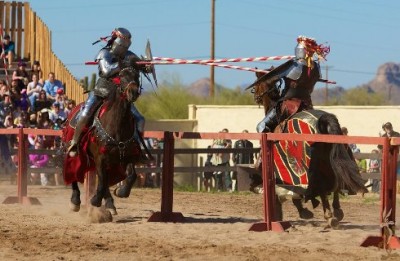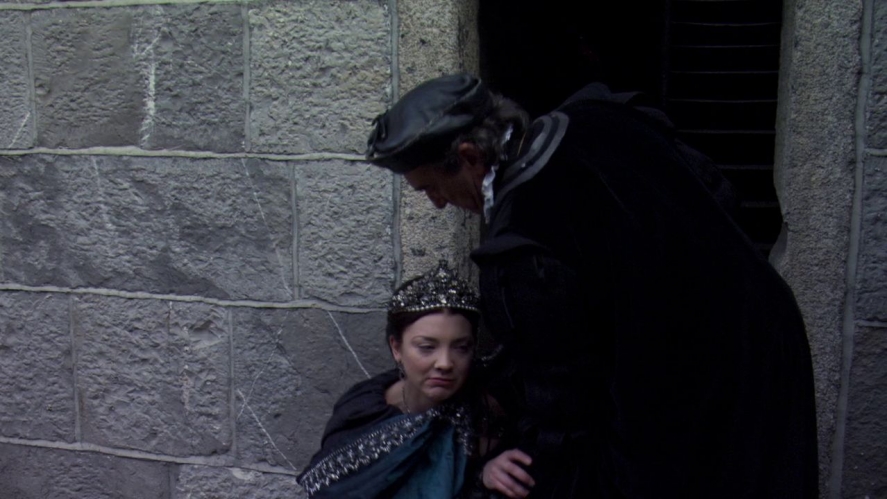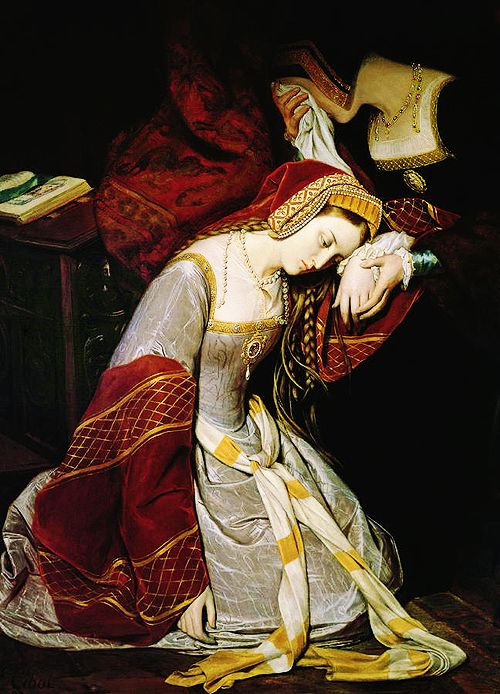the link to part 2 of the series “A fatal love triangle: King Henry VIII, Anne Boleyn, and Jane Seymour” is here

The drama continued on the traditional May Day joust at Greenwich Palace. Queen Anne was aware that something had gone wrong: King Henry attended extended council meetings, their trip to Calais had been cancelled, and the tension in the air was so thick it must have been tangible. The May joust began as normal, Henry seemed to be in good spirits, talked to the participants in a friendly voice, and watched with interest armored opponents charge on horseback.
Unexpectedly, Henry left the joust abruptly, taking Sir Henry Norris with him. Eric Ives writes about the fateful May Day joust:
“Indeed, if we may trust the French verse account of 2 June 1536, the king was very affable and offered his own mount when Sir Henry’s renowned charger began to play up. But suddenly, at the end of the joust, Henry left for Whitehall, travelling on horseback instead of by river and with only six attendants, one of them Norris whom, throughout the journey, he had ‘in examination and promised him his pardon in case he would utter the truth.”
The fateful 2nd of May 1536 was the last day of Anne Boleyn’s freedom. By that time, Mark Smeaton was already in Thomas Cromwell’s clutches: he had been detained at Cromwell’s house on the 30th of April, accused of adultery with the queen and, most likely, had been tortured to get the confession out of him. Henry Norris was already incarcerated in the Tower. Anne’s brother, George Boleyn, was at York Place, where he was apprehended in the same afternoon.
In the morning, Anne received an order to present herself to the King’s council, presided over by her uncle, Thomas Howard, Duke of Norfolk. She was informed that she was accused of adulteries with several paramours, including Norris and Smeaton. She was notified that Smeaton had confessed to being her lover. In response, the queen denounced all of the accusations, but of course nobody listened to her. Then Anne was ordered to stay in her chambers, waiting for the tide of the River Thames to turn so that she could have been taken to the Tower by barge.
According to Charles Wriothesley, Windsor Herald of Arms, Anne was escorted to the Tower by Sir Thomas Audley, the Duke of Norfolk, Thomas Cromwell, and Sir William Kingston, Constable of the Tower of London. Wriothesley claimed that Anne’s barge arrived at 5pm, and that she entered the Tower through the Court Gate of the Byward Tower, the same place where Henry VIII greeted her at her coronation in 1533. There is a common misconception that Anne entered the Tower through Traitors’ Gate, which might not be really true.
Anne was in an emotional turmoil, on the verge of a complete breakdown. The proud, arrogant, and well-mannered queen changed into a distraught woman unjustly accused of abominable things and abandoned by her husband.

Wriothesley claimed that the queen:
“She fell down on her knees before the said lords, beseeching God to help her as she was not guilty of her accusements, and also desired the said lords to beseech the King’s grace to be good unto her, and so they left her their prisoner.”
Kingston sent to Cromwell a letter, in which he described Anne’s behavior upon her arrival:
“On my lord of Norfolk and the King’s Council departing from the Tower, I went before the Queen into her lodging. She said unto me, “Mr. Kingston, shall I go into a dungeon?” I said, “No, Madam. You shall go into the lodging you lay in at your coronation.” “It is too good for me, she said; Jesu have mercy on me;” and kneeled down, weeping a good pace, and in the same sorrow fell into a great laughing, as she has done many times since.
She desired me to move the King’s highness that she might have the sacrament in the closet by her chamber, that she might pray for mercy, for I am as clear from the company of man as for sin as I am clear from you, and am the King’s true wedded wife. And then she said, Mr. Kingston, do you know where for I am here? and I said, Nay. And then she asked me, When saw you the King? and I said I saw him not since I saw [him in] the Tiltyard. And then, Mr. K., I pray you to tell me where my Lord my father is? And I told her I saw him afore dinner in the Court. O where is my sweet brother? I said I left him at York Place; and so I did.
I hear say, said she, that I should be accused with three men; and I can say no more but nay, without I should open my body. And there with opened her gown. O, Norris, hast thou accused me? Thou are in the Tower with me, and thou and I shall die together; and, Mark, thou art here to. O, my mother, thou wilt die with sorrow; and much lamented my lady of Worcester, for by cause that her child did not stir in her body. And my wife said, what should be the cause? And she said, for the sorrow she took for me. And then she said, Mr. Kyngston, shall I die without justice? And I said, the poorest subject the Kyng hath, hath justice. And there with she laughed.”
The decision to charge Anne with high treason seems to have been made by the 24th of April 1536. Why wasn’t Anne detained on the same date? Henry was tired of his second wife, who already was Cromwell’s archenemy, and all postponements and delays smelled danger. The Tudor main rule was to apprehend first and then to interrogate and torture, but Anne still had her freedom for more than a week, and the arrests of her alleged lovers took place piecemeal.
Eric Ives makes his own conclusion:
“The resolution to these questions is often said to be that Henry willed the end but kept aloof from advance knowledge of the means. Yet to suppose this is to suppose that Cromwell chose a remarkably risky course.”
Alison Weir writes about Henry’s attitude to Anne’s arrest:
“By now Henry had convinced himself that Anne had been a monster of lechery. He remembered her ruthlessness in hounding Wolsey to his death, how she had more or less admitted her involvement in the plot to poison Fisher, and how she had urged him to have Katherine and Mary executed or murdered. Henry had heard the rumours that Katherine had died of poison, and was now convinced that Anne had been responsible.”
We don’t know what role Henry played in the conspiracy against Anne. The king ordered Anne’s execution, but we cannot say for a certainty whether or not he believed in her multiple adulteries with several men, all of them courtiers and one of them the queen’s own brother.
Perhaps Cromwell, Anne’s sworn foe, fed the monarch lies about her and fabricated charges against her. After all, he led the interrogation of all the witnesses, and it was easy for him to collect the necessary proof of her guilt. But it is difficult for me to believe that Henry was such an utter fool that he could not differentiate between lies and truth, and I do not rule out the possibility that he personally commanded Cromwell to get rid of Anne no matter the cost.

If Henry truly believed that she had betrayed him, then he considered her a traitor to England and personally to him – such a selfish and narcissistic man as Henry would not have forgiven her. If Henry tasked Cromwell with finding a way out of his marriage, and if he didn’t realize how far his chief minister would go to satisfy his liege lord’s desire, then Henry might have been shocked to learn about Anne’s “crimes and treason”, but after her arrest the king would not have changed anything because it was already too late – Henry was so close to obtaining his freedom.
There is a fair chance that Henry knew about Anne’s innocence and patiently waited for her execution. Was Henry a spider weaving its web to capture his unwanted wife in it? Was he play-acting during several weeks, patiently waiting for Cromwell to fabricate charges? Henry was an emotional man prone to anger and outbursts, and one may say that such a man couldn’t have played a game for weeks; yet, the king could have been patient and calculative if necessary.

Several years after Anne’s death, King Henry would be “betrayed” again, this time by young Catherine Howard, Anne’s cousin. Presented with the proof of Catherine’s adulteries, Henry threatened to kill her with a sword himself. It must have been a bizarre emotional outburst of the aging monarch cuckolded by his wife! That outburst was not theatrical – it was the expression of the king’s real fury. When Anne was arrested, Henry behaved differently: there were no emotional outbursts and threats to destroy her with his bare hands, and his coldness might prove either his utter shock with Cromwell’s investigation or his knowledge of Anne’s innocence and, thus, his conscious choice to rid himself of Anne by murdering her.
Regardless of whether Henry believed the accusations, or whether he planned her downfall, Anne had no chance to survive – her failure to bear a healthy son doomed her. She was abandoned by everyone, left alone on a sinking ship. One of her very few remaining supporters, Archbishop Cranmer, sent Henry a letter next day after her arrest, but it could not save her.
More about interrogations and arrests will be said in the next part (part 4) of the series.
All images are in the public domain.
Text © 2020 Olivia Longueville




